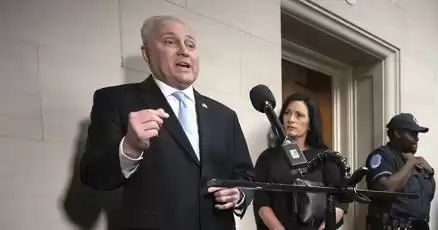Republicans Nominate Steve Scalise for House Speaker but Struggle to Quickly Unite and Elect Him
House Republicans have nominated Rep. Steve Scalise to be the next House speaker, but deep divisions within the party have delayed the election process. Scalise narrowly beat Rep. Jim Jordan in a private ballot, but it remains uncertain whether lawmakers who supported Jordan will back Scalise in a full House vote. The GOP majority is divided, and Democrats are expected to oppose the Republican nominee.
In a stunning turn of events, Republicans have nominated Rep. Steve Scalise to be the next House speaker, but the deeply divided majority is struggling to unite and elect him in a public floor vote. This comes after the historic ousting of Rep. Kevin McCarthy from the job. In a private balloting at the Capitol, House Republicans narrowly chose Scalise over Ohio Rep. Jim Jordan, the firebrand Judiciary Committee chairman. Scalise, who is battling blood cancer, is considered a hero by some after surviving a shooting at a congressional baseball game practice in 2017. However, tensions are still running high among Republicans, and the House remains at a standstill with the next steps uncertain.
The current situation in Congress is one of political chaos and uncertainty. Just 10 months ago, Republicans took power with the goal of operating as a team and running the government more efficiently. However, the GOP majority has drifted far from that goal. Scalise acknowledged the need to send a message that the House is open to doing the people's business, but it remains to be seen whether lawmakers who supported Jordan, the hard-liner backed by Donald Trump, will throw their support behind Scalise in the full House vote. Democrats are expected to oppose the Republican nominee.
The removal of McCarthy as speaker has highlighted the oversized role that a few lawmakers can have in choosing his successor. In a floor vote, Scalise would need to secure votes from almost all Republicans to overcome Democratic opposition. However, some lawmakers have already announced that they will not support Scalise. The absence of a proposed rules change that would have ensured a majority vote before the nominee was presented for a full floor vote adds to the uncertainty. Many Republicans want to avoid a messy House floor fight like the one that occurred in January when McCarthy became speaker.
Scalise, Jordan, and McCarthy have all been contenders for leadership positions in the past, with McCarthy and Scalise still engaged in a rivalry. Scalise was next in line for the job after McCarthy's removal, but Jordan posed a challenge as a more hard-right option. Jordan's close alliance with Trump, particularly during the former president's efforts to overturn the 2020 election results, has earned him support from Trump himself. Several lawmakers, including Rep. Matt Gaetz, who orchestrated McCarthy's ouster, have expressed their willingness to support either Scalise or Jordan.
As the chaos continues in Congress, McCarthy has ruled out a comeback, and the hard-liners who engineered his removal show no signs of budging. Crews have been seen removing boxes and artwork from McCarthy's former office, signaling the end of his tenure as speaker. The path forward remains unclear, but one thing is certain: Republicans must find a way to unite and move forward in order to effectively govern and deliver for the American people.











Comments on Republicans Nominate Steve Scalise for House Speaker but Struggle to Quickly Unite and Elect Him